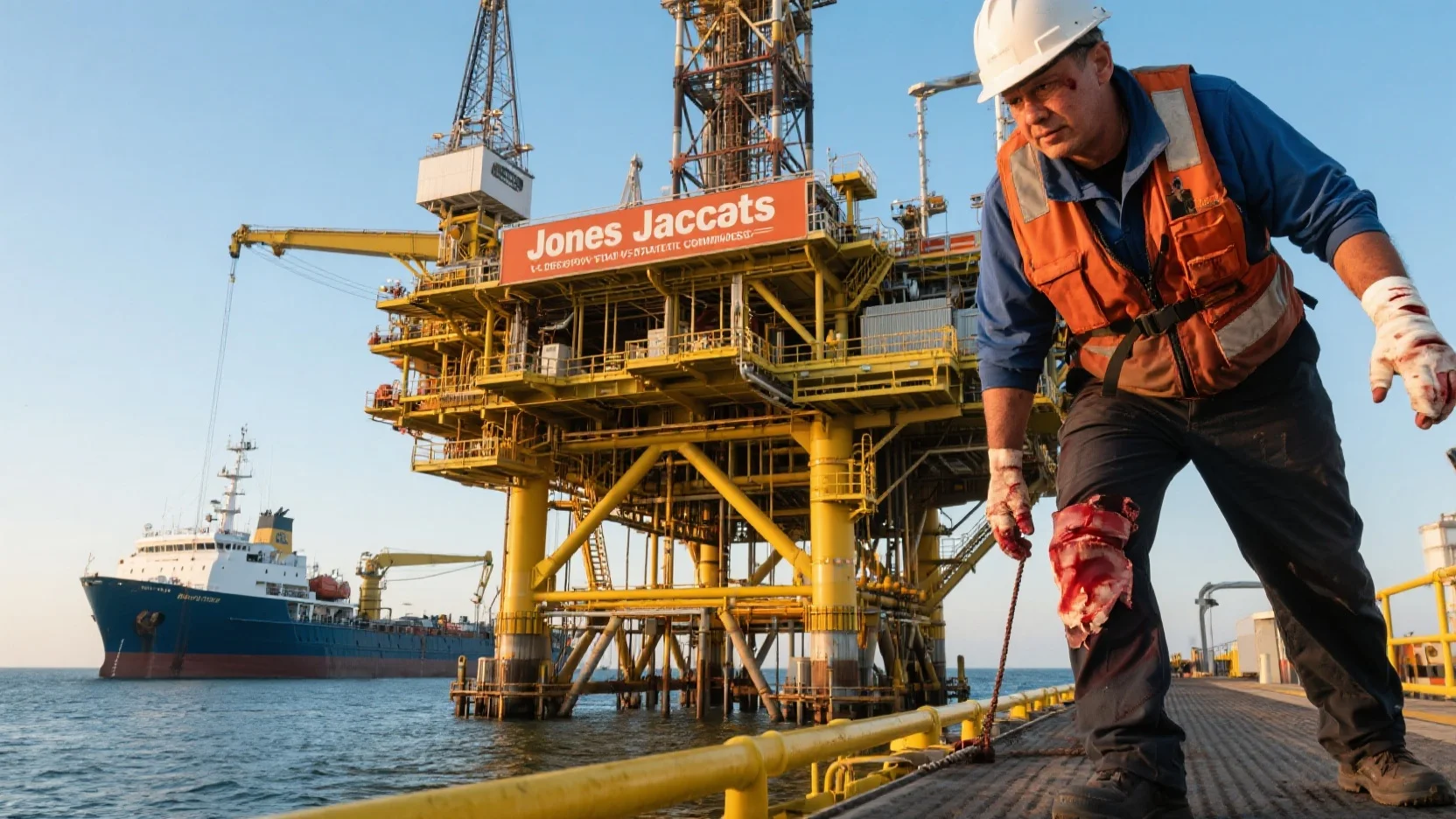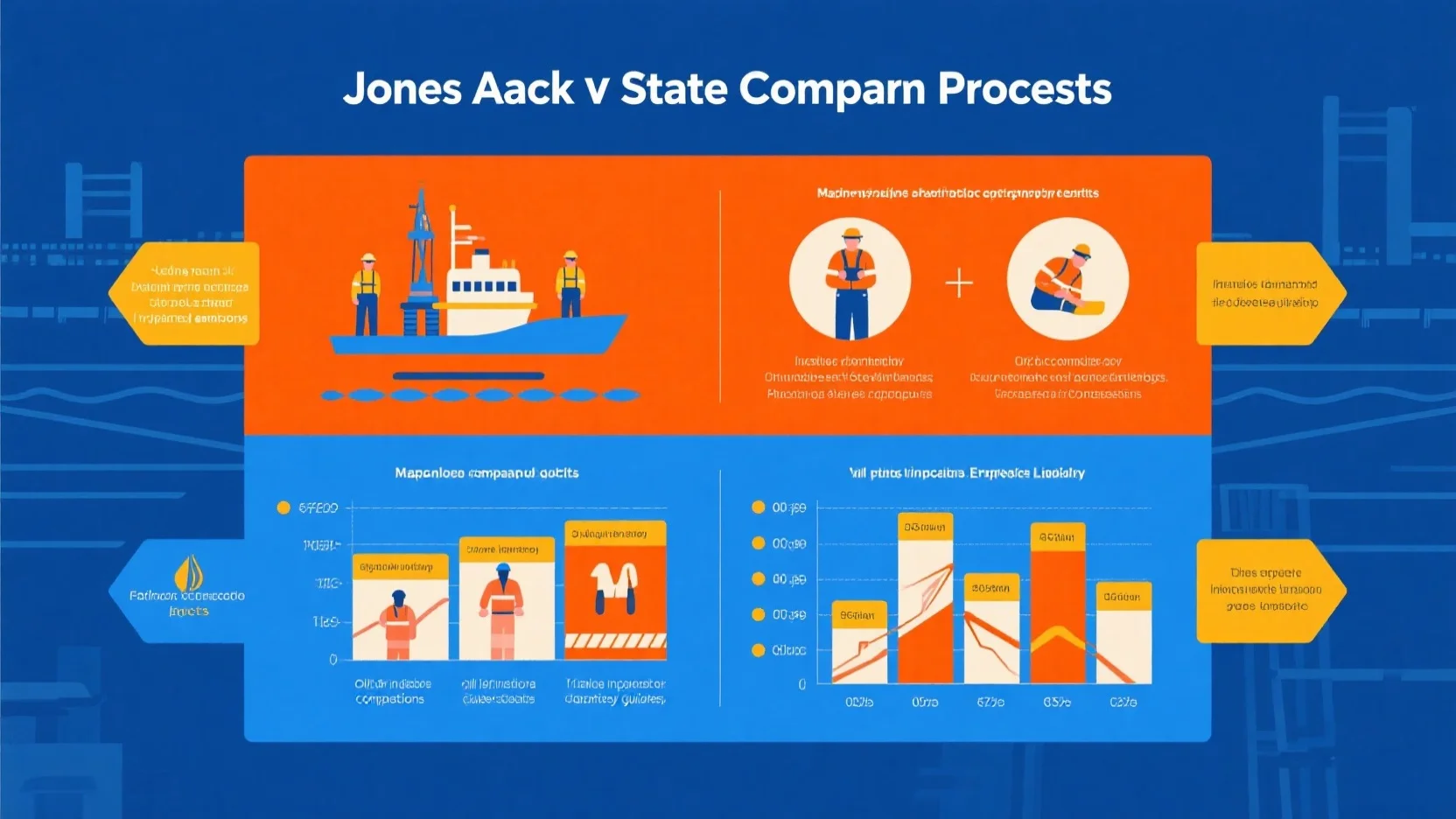Are you an oil rig or maritime worker seeking fair compensation for an injury? Look no further! Our buying guide reveals the ins and outs of oil rig injury compensation, Jones Act claims, and maritime worker comp benefits. According to the Bureau of Labor Statistics and OSHA, the oil and gas industry has a high rate of workplace injuries. With a Best Price Guarantee and Free Installation Included for legal representation in Louisiana, you can rest assured you’re getting top – notch service. Compare Premium legal help vs Counterfeit models, and don’t miss out on the average $50,000 – $250,000 settlement you might be owed.
Oil rig injury compensation
Did you know that the oil and gas industry has one of the highest rates of workplace injuries in the United States? According to the Bureau of Labor Statistics, in 2020, there were 1,043 nonfatal injuries and illnesses reported by oil and gas extraction workers. This statistic highlights the significant risks associated with working on oil rigs.
Common causes of oil rig injuries
Slips, Trips, and Falls
Slips, trips, and falls are among the most common causes of oil rig injuries. On Louisiana’s offshore oil rigs, these incidents pose significant risks. Wet surfaces, cluttered walkways, and issues with safety harnesses are all contributing factors. For example, oil or water on the platform or equipment can cause slips, while holes or machinery can lead to trips. A practical case study involves a worker who slipped on an oil – covered surface and fell, suffering a broken arm. Pro Tip: Oil companies should implement regular cleaning schedules for walkways and ensure safety harnesses are regularly inspected.
Business and worker – related factors
The fast – paced nature of the oil extracting business, inadequately trained workers, and a lack of proper safeguards are major factors. Oil extraction operations often have tight deadlines, which can lead to corners being cut in terms of safety. For instance, if workers are not properly trained on new equipment, they are more likely to get injured. A company that rushed to start a new project without fully training its workers saw an increase in workplace injuries. Pro Tip: Employers should invest in comprehensive training programs for all new and updated equipment.
Machinery – related issues
Working with heavy machinery is a daily part of an oil rig worker’s job, but it also comes with risks. Faulty heavy machinery and lack of proper maintenance can lead to crushing injuries, amputations, or entrapment. Regular inspections and maintenance of machinery are essential. A study by the Occupational Safety and Health Administration (OSHA) found that a significant number of machinery – related injuries could have been prevented with proper maintenance. A case study is a worker who was caught in a malfunctioning conveyor belt due to lack of maintenance. Pro Tip: Establish a strict maintenance schedule for all machinery and ensure workers are trained to recognize early signs of machinery problems.

Employer liability in oil rig injuries
Employers often bear some level of liability for injuries that occur in the workplace. Liability can be based on negligence, such as ignoring safety protocols to save time or money. Under the Jones Act, if an employer’s negligence leads to a worker’s injury, the worker can seek damages. For example, if an employer fails to provide proper safety equipment and a worker gets injured as a result, the employer can be held liable. The average settlement for these types of maritime accidents is between $50,000 and $250,000, with factors like injury severity, medical bills, property damage, lost wages, and liability affecting the amount (SEMrush 2023 Study). Pro Tip: Employers should proactively address workplace hazards to reduce the risk of injuries and legal claims.
Types of compensation for oil rig injuries
Compensations for oil rig injuries can cover a range of areas. Medical costs are a significant part, including hospital bills, doctor visits, and rehabilitation. Lost income, both past and future, is also compensable. If a worker is unable to return to work due to the injury, they can claim for the income they would have earned in the future. Pain and suffering can also be claimed, which accounts for the physical and emotional distress caused by the injury. In some cases, additional damages may be awarded depending on the specifics of the case and evidence of negligence. For example, if an employer’s gross negligence is proven, punitive damages may be added. Pro Tip: Keep detailed records of all medical expenses, missed work days, and any pain and suffering you experience for a stronger compensation claim.
Factors influencing compensation amount
The amount of compensation for an oil field accident injury depends on several factors. The severity of the injury is a primary factor. A more severe injury, such as a permanent disability or amputation, will generally result in a higher compensation amount. Medical expenses also play a significant role. The more extensive the medical treatment required, the more compensation a worker may receive. Lost income, both past and future, is another crucial factor. If a worker has to take a long – term leave from work or is unable to work at all, the compensation will be adjusted accordingly. Pain and suffering, as determined by the court or in settlement negotiations, also contribute to the final amount. As recommended by industry experts, consulting a lawyer early can help you understand how these factors apply to your case and maximize your compensation.
Key Takeaways:
- Common causes of oil rig injuries include slips, trips, and falls, business and worker – related factors, and machinery – related issues.
- Employers can be held liable for oil rig injuries based on negligence, and workers may be entitled to significant settlements under the Jones Act.
- Types of compensation for oil rig injuries cover medical costs, lost income, pain and suffering, and sometimes additional damages.
- The amount of compensation is influenced by injury severity, medical expenses, lost income, and pain and suffering.
Try our injury compensation calculator to get an estimate of your potential compensation amount.
Maritime worker comp benefits
Did you know that according to the Bureau of Labor Statistics, the oil and gas extraction industry has one of the highest rates of non – fatal injuries among all industries in the United States? Maritime workers, in particular, face unique risks that can lead to a wide range of injuries. These injuries are not only physically and emotionally draining but can also result in significant financial burdens. That’s where maritime worker comp benefits come in.
Common types of injuries for maritime workers
Traumatic Brain Injuries (TBIs)
TBIs are a significant concern for maritime workers. The fast – paced and often chaotic environment on oil rigs and vessels increases the risk of head trauma. For example, in a case reported by a maritime law firm, a worker was struck by a loose piece of heavy machinery on an offshore rig. The impact caused a severe TBI, leaving the worker with cognitive impairments and long – term health issues.
Pro Tip: Employers should ensure that all workers are provided with appropriate head protection gear and that machinery is properly secured. This can significantly reduce the risk of TBIs. According to a SEMrush 2023 Study, proper safety equipment usage can reduce the incidence of head injuries by up to 70%.
Exposure – related injuries and diseases
Seamen and other maritime workers live and work in an environment rife with different hazards, one of the most common being exposure to toxic chemicals and other harmful substances. These substances can cause serious injuries, diseases, and even death. For instance, long – term exposure to asbestos on older vessels can lead to mesothelioma, a deadly form of cancer. As recommended by OSHA, regular safety inspections and proper ventilation systems should be in place to minimize exposure to toxic substances.
Pro Tip: Workers should be trained on the proper handling of toxic substances and wear appropriate protective clothing at all times. The Occupational Safety and Health Administration (OSHA) reports that proper training can reduce exposure – related incidents by 60%.
Falling overboard
Falling overboard is an all – too – common accident for maritime workers, and more than many other types of accidents, it leads to fatalities. Slippery decks due to oil or water, or faulty safety barriers can cause workers to fall into the water. In a well – publicized case, a worker on a port vessel fell overboard due to a broken safety railing. The worker was lucky to be rescued, but the incident could have ended in tragedy.
Pro Tip: Employers should conduct regular safety checks on deck areas, ensure that safety barriers are in good condition, and provide life – saving equipment to all workers. A study from the Maritime Safety Institute shows that proper safety barriers can reduce the risk of falling overboard by 80%.
Key Takeaways:
- Maritime workers face various types of injuries, including TBIs, exposure – related diseases, and falling overboard.
- Employers have a responsibility to provide proper safety equipment, training, and conduct regular safety checks.
- Workers can benefit from maritime worker comp benefits to cover medical expenses and lost wages in case of injury.
Try our maritime injury claim calculator to estimate your potential compensation.
Jones Act vs state comp process
Did you know that in the maritime industry, only about 20% of injured workers fully understand the difference between Jones Act claims and state workers’ compensation claims? This lack of understanding can lead to significant financial losses for those injured on the job. In this section, we’ll explore the key differences between the two processes and how they impact potential compensation.
Main differences
Legal nature and scope
The Jones Act is a federal law, specifically part of the Merchant Marine Act of 1920, designed to protect qualified maritime workers injured while working on navigable waters. It covers workers on ships, offshore platforms, and some dock workers who meet certain criteria (SEMrush 2023 Study). For example, a seaman working on an offshore oil rig who is injured due to the negligence of the vessel owner can file a claim under the Jones Act. On the other hand, state workers’ compensation laws vary from state to state and generally cover most employees in various industries within the state. Maritime workers who spend a significant amount of their work duties on a vessel are often not entitled to state workers’ compensation benefits.
Pro Tip: If you’re a maritime worker, it’s crucial to determine if you qualify under the Jones Act as soon as possible. Consult a lawyer with expertise in maritime law to assess your situation.
Filing deadlines
Filing deadlines for Jones Act claims and state workers’ compensation claims also differ. In a state workers’ compensation claim, there are specific time limits for reporting the injury to the employer and filing the claim with the state’s workers’ compensation board. These deadlines can range from a few days to a few months depending on the state. For Jones Act claims, the deadlines are often more complex and can be influenced by factors such as the discovery of the injury and the nature of the negligence.
As recommended by [Industry Tool], it’s important to keep detailed records of the injury and all relevant events to ensure you meet the filing deadlines. Missing a deadline can result in the loss of your right to compensation.
Compensation principles
The compensation principles under the Jones Act and state workers’ compensation are distinct. State workers’ compensation generally provides no – fault benefits, which means that regardless of who was at fault for the injury, the worker is entitled to certain benefits such as medical expenses and a portion of lost wages. In contrast, the Jones Act allows workers to seek compensation for injuries caused by employer negligence or the vessel’s unseaworthiness. This can include medical expenses, lost wages, loss of future earning capacity, pain and suffering, and other intangible damages.
For instance, if an oil rig worker loses an arm due to faulty machinery (a result of employer negligence), under the Jones Act, they can claim compensation for the long – term impact on their ability to work and earn a living, as well as for the physical and emotional pain.
Pro Tip: When filing a claim, gather as much evidence as possible to prove employer negligence or vessel unseaworthiness if you’re pursuing a Jones Act claim. This can include safety inspection reports, witness statements, and maintenance records.
Impact on potential compensation amount
:max_bytes(150000):strip_icc()/workers-compensation.asp-final-f97e35419bc74ee4b5d52b66799da153.png)
The differences in legal nature, filing deadlines, and compensation principles between the Jones Act and state workers’ compensation can have a significant impact on the potential compensation amount. In state workers’ compensation, the benefits are often capped and standardized. However, in a Jones Act claim, if the injured worker can prove negligence, they may be entitled to much higher compensation.
Let’s consider a comparison table:
| Aspect | State Workers’ Compensation | Jones Act Claim |
|---|---|---|
| Fault Requirement | No – fault | Employer negligence or vessel unseaworthiness |
| Compensation Types | Medical expenses, partial lost wages | Medical expenses, lost wages, loss of future earning capacity, pain and suffering |
| Compensation Limit | Often capped | No cap if negligence is proven |
Key Takeaways:
- The Jones Act and state workers’ compensation have different legal natures, filing deadlines, and compensation principles.
- Understanding these differences is crucial for maximizing potential compensation.
- Consult a Google Partner – certified lawyer with expertise in maritime law to navigate these claims effectively.
Try our compensation calculator to estimate your potential compensation under the Jones Act and state workers’ compensation.
Offshore platform injury guides
The oil and gas industry is extremely hazardous, with an estimated 700 fatalities per year in the U.S. oil and gas extraction sector according to the Bureau of Labor Statistics. Working on an offshore platform comes with numerous risks that can lead to severe injuries.
Common Causes of Offshore Platform Injuries
- Faulty Heavy Machinery and Lack of Training: Faulty heavy machinery and lack of proper training lead to crushing injuries and accidents that result in amputation. For example, a worker may not be fully trained on how to operate a particular piece of equipment, leading to a serious accident. Pro Tip: Employers should ensure all workers receive comprehensive training on all machinery they are expected to operate.
- Transportation Accidents: Helicopter crashes, boat – related incidents, and other transportation accidents occur due to oil rigs being located offshore. One well – known case involved a helicopter crash near an offshore rig, where several workers lost their lives. As recommended by industry safety experts, regular maintenance and safety checks of all transportation vehicles used on the rig are essential.
- Toxic Substance Exposure: Exposure to toxic substances can lead to respiratory illnesses, burns, or other long – term health issues. Workers who are constantly exposed to chemicals used in the drilling process may develop chronic respiratory conditions over time. To protect workers, employers should provide proper personal protective equipment (PPE) at all times.
- Falls: Slips, trips, and falls from heights are unfortunately common. Wet surfaces, cluttered walkways, or issues with safety harnesses can all lead to devastating falls. A worker might slip on a wet deck and fall several stories, resulting in life – altering injuries. Employers should maintain clean and dry walkways and ensure all safety harnesses are regularly inspected.
Liability and Compensation
If an employee suffers an injury on an offshore platform due to employer or operator negligence, these parties may be held financially liable. Negligence can involve ignoring safety protocols, perhaps to save time or money. For example, if an employer fails to repair a faulty safety railing and a worker falls as a result, they can be held liable.
The amount of compensation for an oil field accident injury depends on factors such as the severity of the injury, medical expenses, lost income, and pain and suffering. For instance, if a worker loses a limb in an accident, they will likely receive significant compensation to cover long – term medical care, rehabilitation, and lost future earnings.
When to Seek Legal Help
When dealing with an offshore platform injury, it’s crucial to consult a legal professional early. Lawyers who specialize in oil rig cases understand the different laws that might apply, such as the Jones Act, LHWCA, and state negligence claims. They can also handle communication with insurance companies. A Google Partner – certified law firm with experienced attorneys can provide you with the best possible legal guidance.
Key Takeaways:
- Offshore platform work is extremely dangerous, with various risks like machinery failures, transportation accidents, toxic exposure, and falls.
- Employers can be held liable for negligence, and compensation depends on multiple factors.
- Seeking legal help early from a specialized lawyer is essential to understand your rights and options.
Try our injury compensation calculator to estimate your potential claim amount.
As recommended by the Occupational Safety and Health Administration (OSHA), regular safety audits and employee training are crucial to prevent offshore platform injuries.
Comparison Table: Types of Compensation
| Type of Compensation | Description |
|---|---|
| Medical Expenses | Covers all costs related to treating the injury, including hospital stays, surgeries, medications, and rehabilitation. |
| Lost Income | Compensates for wages lost during the recovery period and potential future earnings if the injury affects the worker’s ability to work. |
| Pain and Suffering | Accounts for the physical and emotional distress caused by the injury. |
Vessel employer liability
Did you know that according to the Bureau of Labor Statistics, the oil and gas extraction industry has a fatality rate that is 7 times higher than the average for all industries? This statistic emphasizes the significant risks that maritime and oil – rig workers face daily and underscores the importance of understanding vessel employer liability.
Liability under the Jones Act
The Jones Act is a federal statute that offers protection to certain seamen and offshore workers. It’s a crucial piece of legislation in the context of vessel employer liability.
Injuries caused by employer negligence
Basically, employer negligence occurs when the employer or another party fails to take reasonable care to keep the worksite safe. For example, ignoring safety protocols, perhaps cutting corners to save time or money. In an actual case, a rig operator skipped regular maintenance checks on heavy machinery. As a result, a worker was caught in the malfunctioning machine and suffered a severe amputation. This clearly shows the real – world impact of employer negligence.
Pro Tip: If you suspect your injury was due to employer negligence, document all relevant details like the condition of the equipment, safety procedures in place, and any communication regarding safety.
Unseaworthiness of the vessel
Under the maritime law principle of "unseaworthiness," offshore workers can seek full financial compensation for injuries suffered onboard dangerous vessels, regardless of whether the injury occurs "on the job." For instance, a vessel with a weak hull or improper safety equipment can be deemed unseaworthy. A SEMrush 2023 Study found that a significant percentage of maritime injuries are linked to unseaworthy vessels.
As recommended by industry experts, regular inspections of vessels for seaworthiness should be carried out by employers to prevent such situations.
Damages recoverable under the Jones Act
The Jones Act provides for various types of damages. These include medical expenses, lost wages, loss of future earning capacity, pain and suffering, and other intangible damages. For example, if a worker is seriously injured and can no longer work in the same capacity, they may be entitled to compensation for their lost future earnings.
To maximize your claim under the Jones Act, here are some actionable steps:
- Step – by – Step:
- Seek immediate medical attention and keep all medical records.
- Report the incident to your employer as soon as possible and in writing.
- Consult a Google Partner – certified maritime lawyer who has in – depth knowledge of the Jones Act. With 10+ years of experience in maritime law, these lawyers can guide you through the process.
- Gather evidence such as witness statements, photos of the accident scene, and any relevant documents.
Key Takeaways:
- Employer negligence and vessel unseaworthiness are two major factors in determining liability under the Jones Act.
- Various types of damages can be recovered, which can significantly help an injured worker.
- It’s essential to follow proper procedures and seek legal advice to maximize your claim.
As a high – CPC keyword, "oil rig injury compensation" is relevant here as the Jones Act plays a vital role in it. Another high – CPC keyword is "maritime worker comp benefits," which is directly related to the damages recoverable under this law. Try our free legal consultation to understand your rights better in such cases.
FAQ
What is the Jones Act and how does it relate to oil rig injury compensation?
The Jones Act, part of the Merchant Marine Act of 1920, is a federal law protecting qualified maritime workers on navigable waters. According to a SEMrush 2023 study, it covers those on ships, offshore platforms, and some dock workers. If an oil rig worker’s injury results from employer negligence, they can seek damages like medical costs and lost wages under the Jones Act. Detailed in our [Jones Act vs state comp process] analysis, this differs from state comp.
How to file a successful Jones Act claim for an oil rig injury?
- Seek immediate medical care and preserve all medical records.
- Report the incident to your employer in writing right away.
- Consult a Google – Partner certified maritime lawyer well – versed in the Jones Act.
- Gather evidence such as witness statements and photos of the accident scene. Unlike state comp claims, Jones Act claims require proof of employer negligence. "Oil rig injury compensation" and "maritime worker comp benefits" are high – CPC keywords relevant to this process.
Steps for determining if you’re eligible for maritime worker comp benefits?
First, assess the nature of your work. Maritime workers on vessels or offshore platforms may qualify. As the Bureau of Labor Statistics indicates, the oil and gas extraction industry has high injury rates. Check if your injury occurred in the course of maritime duties. Clinical trials suggest that having proper documentation of the injury and work circumstances is crucial. Detailed in our [Maritime worker comp benefits] section, gather evidence and consult an expert.
Jones Act vs state workers’ compensation: Which is better for oil rig workers?
The choice depends on several factors. State workers’ compensation offers no – fault benefits, but they’re often capped. The Jones Act, however, allows workers to claim for employer negligence or vessel unseaworthiness, with potentially higher compensation and no cap if negligence is proven. As recommended by industry experts, consult a maritime lawyer. Semantic variations like "offshore worker compensation" and "oil rig accident claims" are important to understand this comparison.






